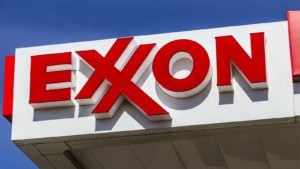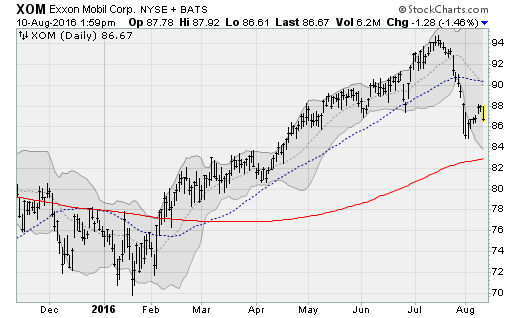Exxon Mobil Corp (NYSE:XOM) has made it very clear that it is committed to paying its existing dividend. As a result, XOM stock now has a very high dividend yield of 10.67% that offers great value to shareholders.

On Oct. 28, Exxon declared a quarterly dividend of 87 cents payable on Dec. 10 to shareholders who own the stock before the Nov. 10 ex-dividend date. As of Oct. 30, XOM stock traded at $32.62, so the annual $3.48 dividend per share now has a 10.67% yield.
Exxon’s Commitment to the Dividend
Two days later the company defended the dividend payment on its earnings conference call. Here is what Exxon Senior Vice President and Principal Financial Officer Andrew Swiger said on the call:
“… but our long term allocation priorities remain unchanged; investing at (sic) advantaged projects, maintaining a strong balance sheet and paying a reliable and growing dividend.”
In fact, during the call, various execs talk about paying a “reliable” dividend three different times. The company’s dividend was mentioned 33 times during the call. Here is another statement Swiger made:
“We are looking to increase divestments and working to maintain the dividend, while holding gross debt at second quarter levels.”
At another point in direct response to a question about whether the dividend would be maintained if the price of oil stayed in the low 40’s, he said:
“From an overall messaging point, our objective is to maintain the dividend, advance the highest value investments, and maintain the debt at a cost competitive limit.”
Why This Is Controversial
The Wall Street Journal pointed out in an article on Oct. 30 that the company’s “long-term plan to grow production is unchanged because energy demand will ultimately grow.”
They also reported that the company will cut 15% of its global workforce, including about 1,900 jobs in the U.S. Moreover, the Journal pointed out that CEO Darren Woods embarked on a “spectacularly ill-timed” series of investments designed to increase oil output by 2025.
So the press tends to see this as a trade-off. The company is either paying the dividend or keeping the jobs. The problem with that thinking is the company would probably have had to cut the jobs anyway.
Dividends only come out of free cash flow or more debt. But according to the company’s investor relations data summary, its free cash flow for the Q3 was $784 million, but the dividend paid out cost $3.716 billion.
Therefore, in effect, Exxon had to borrow or draw down its cash balance in order to pay most of the dividend. This is a financial sacrifice the company is willing to make to continue a reputation of having a “reliable” dividend. Keeping jobs is not a trade-off since the company was not producing enough anyway to cover the dividend.
Obviously, Exxon’s management believes it has to right-size in order to remain sufficiently profitable in the long-term.
What to Do With XOM Stock
Exxon stated in its conference call that it believes that demand for oil will return to pre-pandemic levels in 2019. That is what underlines its confidence that it can maintain the high levels of dividend payments.
If this happens, then management will be vindicated. On the other hand, The Wall Street Journal reported that Exxon might sell some of its North American dry gas assets with a carrying value of $25 billion to $30 billion.
That might allow the company to continue paying the dividend at this level without having to borrow money to do so. In any case, it seems that management is quite determined to keep the dividend.
The market doesn’t believe this will be the case and as a result, has pushed XOM down to the point where its yield is over 10%. So far, though, management has shown that they will keep the dividend “reliable.”
So, to them, it is a matter of more than just whether it is affordable. It is a matter of keeping the dividend stable for its shareholders. That implies that they will go to extraordinary lengths to maintain the dividend.
I believe in the long run, this is a good thing for shareholders. If they can rely on the dividend it will also keep the XOM stock stable as well.
On the date of publication, Mark R. Hake did not have (either directly or indirectly) any positions in any of the securities mentioned in this article.
Mark Hake runs the Total Yield Value Guide which you can review here.
